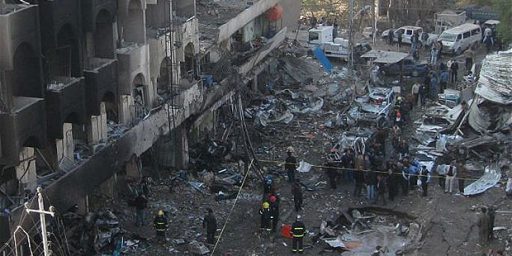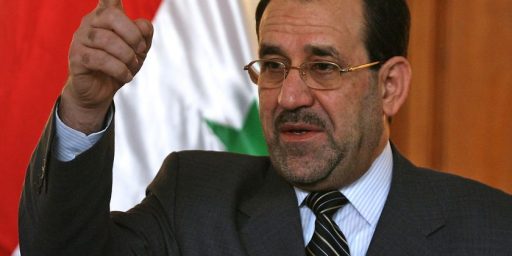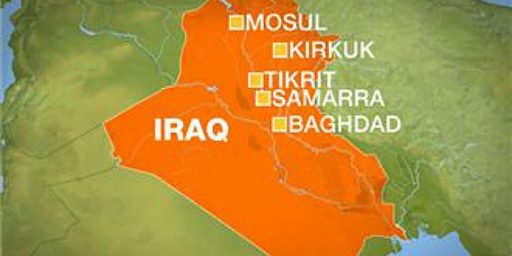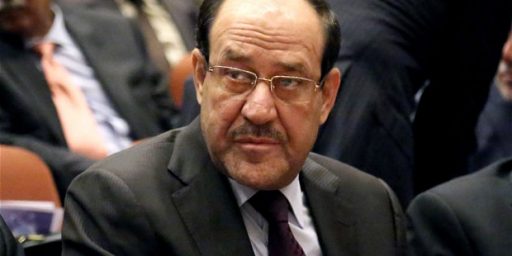U.S. and Iran – Basra Team-Up?
Noah Schachtman notes the irony that the U.S. now finds itself on the same “team” with the Iranian government.
For more than a year, America’s political and military leaders have been angrily accusing Iran of fueling the violence in Iraq. But, in the battle for Basra, the U.S. suddenly finds itself in the odd position of being, in effect, Tehran’s ally against a common foe.
Basra has become the epicenter of a fight between Shi’ite factions. On one side, there’s Moktada al-Sadr, the homegrown firebrand and long-time thorn in the side of American forces. On the other, there’s the team of Da’wa (the party of Prime Minister Nouri al-Maliki) and the former Supreme Council for the Islamic Revolution in Iraq (which runs most of the country’s security services). Both SCIRI and Da’wa have decades-deep connections to Iran. “Shiite rivals, particularly the party loyal to the cleric Moktada al-Sadr, regularly accuse the Supreme Council of being a tool of the Iranian intelligence service. The party’s top officials, including its leader, Abdul Aziz al-Hakim, lived in Iran for decades and still frequently return,” the Times observes.
“SCIRI was essentially created by Iran, and its militia, the Badr Brigade, was trained and equipped by the Revolutionary Guards,” Council on Foreign Relations Iran scholar Ray Takeyh notes in the current Middle East Journal.
It’s an interesting argument but one that masks a complicated reality. The Iranian government naturally wants a Shiite state next door. At the same time, however, it clearly wants the al-Maliki government — and the U.S. mission in Iraq, more generally — to fail. And, goodness, they’ve sheltered al-Sadr for long periods during the current crisis.
Noah’s, right, though, that Sadr is widely perceived to be a more staunch Iraqi nationalist than Maliki, who is considered more friendly to a wider Shiite alliance. But even that’s not cut-and-dried, as his post acknowledges.
That’s not to say Sadr has no ties to Tehran. As with all politics in the Middle East, the relationships are complex. In 2006, Sadr pledged to defend Iran, if it was attacked by the Americans. Many believe Iranian weapons have been funneled to elements of Sadr’s Mahdi Army. “But unlike their relations with SCIRI and Da’wa, Iran’s ties to Sadr are more opportunistic, as they find his sporadic Arab nationalist rhetoric and erratic behavior problematic,” Takeyh observes. “At a time when Sadr is being granted an audience by the Arab leaders and dignitaries across the region, it would be astonishing if Iran did not seek some kind of a relationship with the Shi’ite firebrand.”
But, ultimately, “the Sadrist movement has always been about Iraq for the Iraqis,” Bartle Bull writes. “They might accept help from Iran – and I saw Iranian supplies in their compounds in Najaf in 2004 – but the movement is not for sale. Mr. Sadr gets his strength from the street. And the Arabs of the Iraqi street have no time for Persian bosses.”
Regardless, this isn’t an old Western movie; there’s nobody in this mess that are obviously “good guys” or purely “bad guys.” We’re supporting Maliki’s government because it was the one that got elected. Sadr and his forces decided to sit the process out.






I think the Sadrist movement was branded more as “Iraq for Shi’ites”. Its strength came from protecting Shia from Sunni terrorists. I would guess in Sadr’s mind he simply wants power. I doubt he is much of a nationalist given his ties to Iran.
Really, Iran can afford to be on both teams’ side, because they can play both of them off of each other as well as the United States. As soon as we get out of the region, Iran’s going to be forced to pick sides, which will immediately diminish their influence on the country.
Which, of course, is why we must stay in Iraq: so that Iran doesn’t win.
It’s pretty obvious he just wants power, but he seems timid in seizing it. A cease-fire to calm down your supporters isn’t exactly what History’s major power-brokers are known for doing.
I’m willing to believe he’s more nationalist through, and certainly his followers are, given that his support comes mostly because of his father’s work in Iraq.
Y’know, there’s absolutely no evidence that Sadr fled to Iran other than US say-so. Certainly the Sadrists deny it – as they would, since if Sadr was openly beholden to Iran it would undermine his nationalist appeal in a way that isn’t true for DAWA and the SCIRI. On the evidence of past performance, either could be right or could simply be indulging in some agitprop.
And it’s a wee bit remiss of you to not point out that the reason the Sadrists said they would sit out the election that elected Maliki is that they believed any government would have little sovereignty and be simply a puppet of outside influences for years. It’s difficult to argue they were wrong on that.
Now, of course, the Sadrists are saying they will compete in the next set of elections – which will wipe out SCIRI as the largest Shiite party since all their victories were in the Sadrist parts of the South. Thus the push to demolish Sadr before the elections.
I’m not disagreeing with the main thrust of your post – that all the Shiite factions owe at least something to Iran – just adding some clarification of where the stress points lie.
Regards, C
Did I miss something (very possible)? When did al-Sadr sit out elections? I understood that Maliki became prime minister because he put together a coalition government that included al-Sadr support.
As the “one that got elected,” Maliki’s government gets to be the one to give orders to the Iraqi army. If there’s a short- and middle-term hope for stability after most American combat forces leave Iraq, it’s the Iraqi army.
I have no trouble figuring out who to root for as between the Iraqi army and the Madhis. Nor do I have any doubt that Iran’s interests, at this time and for this purpose, are tied up with al-Sadr.
Well, Beldar, you’ll have to take all that up with Anthony Cordesman, who now says that: (1) al-Sadr has considerably more support among Shiite voters than the current Iraqi government; (2) SCIRI is the crucial bloc controlling the current Iraqi government, and the current attacks on the Sadrists are designed mostly to try and nail down semi-dictatorial control by SCIRI over its Sadrist rivals; and (3) as Joyner also says, SCIRI is considerably more pro-Iranian than Sadr is (a point on which EVERY news story I’ve ever seen on this subject agrees).
Actually, I’ll agree that there’s a good chance that the Iraqi Army — if SCIRI can indeed stomp on its rivals for popular Shiite support using brute military force — will be able to establish “stability” after the US troops leave. It’s just that it will be pro-Iranian stability by a dictatorial government, which will try to keep the US pacified by throwing a few token crumbs to us.
Which, of course, is why we must stay in Iraq: so that Iran doesn’t win.
Posted by Michael
Think this through a little bit. Let’s say that we stay for 20 years, and flourishing democracy springs up. We leave. 2 years later the gangs of Iraq start shooting each other again. Now Iran can try its hand at more influence in the region, but won’t get that far because Iraqi’s are hardcore nationalists.
Let’s say that we stay for 2 years, and the democracy there still sucks. We leave. 1 year later the gangs of Iraq start shooting at each other again. Iran tries its hand at influencing Iraq, but once again runs up against Iraqi nationalism.
Plan20 costs trillions.
Plan2 costs billions.
Let’s pretend you hate America, which plan do you want the Americans to choose? If Iran hates American, why not let the Americans stay! The president of Iran has hardcore ties to the electing ruling party through Maliki. And this way, Iran gets to do to us, what we did to the Russians in Afghanistan. Plan20 leaves us weaker, much weaker. If you think a little longer term than 4 year election cycles, because, you know, you are a supreme religious leader for life like Khameni, then you understand that Plan20 hurts the US and benefits Iran more. Under Plan2, if Iran tries to go all out and seize Iraq after we leave, we will finally have the pretext for a war with Iran.
Try to be more far sighted Michael, and you will understand more.
My only mistake was thinking that such blatant sarcasm could not be missed. I was wrong, and I apologize profusely*.
(*) Also blatant sarcasm, in case you were wondering.
http://www.timesonline.co.uk/tol/news/world/iraq/article3631718.ece . (Further comment by me unnecessary.)
Or maybe not. Apparently the plan to have the Iraqi Army do this has been, er, superceded. http://www.washingtonpost.com/wp-dyn/content/article/2008/03/27/AR2008032700781_pf.html :
“U.S. forces in armored vehicles battled Mahdi Army fighters Thursday in Sadr City, the vast Shiite stronghold in eastern Baghdad, as an offensive to quell party-backed militias entered its third day. Iraqi army and police units appeared to be largely holding to the outskirts of the area as American troops took the lead in the fighting…
“As President Bush told an Ohio audience that Iraq was returning to ‘normalcy,’ administration officials in Washington held meetings to assess what appeared to be a rapidly deteriorating security situation in many parts of the country.
“Maliki decided to launch the offensive without consulting his U.S. allies, according to administration officials. With little U.S. presence in the south, and British forces in Basra confined to an air base outside the city, one administration official said that ‘we can’t quite decipher’ what is going on. It’s a question, he said, of ‘who’s got the best conspiracy’ theory about why Maliki decided to act now.
“In Basra, three rival Shiite groups have been trying to position themselves, sometimes through force of arms, to dominate recently approved provincial elections.
“The U.S. officials, who were not authorized to speak on the record, said that they believe Iran has provided assistance in the past to all three groups — the Mahdi Army; the Badr Organization of the Islamic Supreme Council of Iraq, Iraq’s largest Shiite party; and forces loyal to the Fadhila Party, which holds the Basra governor’s seat. But the officials see the current conflict as a purely internal Iraqi dispute.
“Some officials have concluded that Maliki himself is firing ‘the first salvo in upcoming elections,’ the administration official said.
” ‘His dog in that fight is that he is basically allied with the Badr Corps’ against forces loyal to Sadr, the official said. ‘It’s not a pretty picture.’ ”
It’s reassuring to know that more US troops will soon be dying in the defense of that “Iraqi democracy” that Beldar keeps rhapsodizing about in these pages…
Did I miss something (very possible)? When did al-Sadr sit out elections? I understood that Maliki became prime minister because he put together a coalition government that included al-Sadr support.
The Sadrist current did not run candidates in the January 2005 regional elections. The Sadrist current competed as part of the UIA in the national elections held in December of that year.
Thus, ISCI is overrepresented in Shiite locales due to the Sadrists’ boycott. ISCI fears losing ground to the Sadrists this October, so they’re doing their best to weaken them now.
Not so sure about this James:
The Iranian government naturally wants a Shiite state next door. At the same time, however, it clearly wants the al-Maliki government — and the U.S. mission in Iraq, more generally — to fail. And, goodness, they’ve sheltered al-Sadr for long periods during the current crisis.
The Iranian government likely enjoyed a bit of general chaos early on, but they’re looking to consolidate their gains soon. The way to do that is through establishing their main proxies in power (ISCI and Dawa).
Also, Iran very much wants to see a semi-autonomous Shiite super region created in the South. Sadr vehemently opposes this, and has been exploring forming alliances with Sunnis in order to block it.
This made Tehran very, very angry.